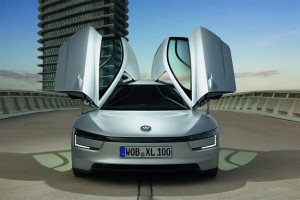
VW is hoping to develop an image of environmental leadership with products like the 261 mpg XL1 hybrid.
Ever since Toyota ran away with the auto industry’s environmental crown after the successful introduction of the Prius more than a decade ago, other automakers have been trying to figure out a way to snatch it away from the Japanese auto giant.
Companies as different in outlook and management style as Nissan and General Motors have sunk a sizable fortune into vehicle electrification as part of as yet-unsuccessful bids to win the environmental mantel from Toyota. Others carmakers, such as Ford and Honda, simply continue plodding along raising fuel economy and campaigning to get consumers to recognize the benefits of their vehicles.
Thus far, the campaigns have helped burnish the reputations of the various makers but they haven’t succeeded in surpassing Toyota.
Now, Volkswagen AG is coming on strong in a bid to challenge Toyota’s leadership in in what is seen as a critical area for winning over fickle younger buyers, who haven’t really committed to any one brand.
The strategy involves not only the launch of new high-mileage products like the 261 mpg VW XL1 — but also sees the German maker reach out to environmental groups that might have once been seen as its adversaries. Last month, the Volkswagen Group announced for the first time its far-reaching decision to reduce the fuel consumption of its new vehicle fleet to a greater extent than had previously been promised. And now, CEO Martin Winterkorn has held his first top-level meeting ever with the militant environmental group Greenpeace.
Winterkorn met directly with Greenpeace chief executive Brigitte Behrens, according to VW officials, focusing on the Volkswagen Group’s climate protection efforts. Winterkorn emphasized the Group would reach the emission target set by EU legislation of an average of 95 grams of carbon dioxide (CO2) per kilometer by 2020.
“I guarantee that we will do everything in our power to reach carbon dioxide emissions of 95 grams without any reservations,” declared Winterkorn, who also chairs VW’s Supervisory Board. “However, this will only be possible if customers accept our advanced alternative powertrains. This is of course our objective.”
Greenpeace Chief Executive Director Behrens made it clear she supports the targets set by Volkswagen. “This is a decision in favor of climate protection and a key signal for committing to the protection of the environment and society and the series production of climate-friendly technical solutions.”
Looking forward, she added, “We will remain in dialogue with Volkswagen, also as regards mobility concepts for the future.” The declaration of Volkswagen is also a signal for stricter exhaust emission regulations in the growth markets of the USA and China, she said after the meeting.
The Greenpeace-VW summit was preceded by nearly two years of preliminary discussions.
“Volkswagen and Greenpeace have been engaging in a constructive and in some cases also confrontational dialog,” VW said in a statement after the meeting. But the maker emphasized that, “Independently from each other, Volkswagen and Greenpeace are convinced that the reduction of carbon dioxide emissions in road traffic is a key factor in climate protection.”
Though slow to launch its own battery-based technologies, the various Volkswagen brands have rapidly begun to ramp-up offerings such as the new Audi A3 e-Tron plug-in hybrid and the new Volkswagen XL1 micro-hybrid, which is expected to deliver a world record 261 mpg when it comes to a market about a year from now.
For its part, the Greenpeace website emphasizes the organizations favors an agenda that calls for sharp, 40% reductions in greenhouse emissions. Greenpeace also wants to make sure emissions peak in 2015 and decrease as rapidly as possible towards zero after that.

Greenpeace wants a lot of things but the world has run out of magic wands… In addition there is a huge lack of “peace” in some of Greenpeace’s efforts to stop the world from existing based on Greenpeace’s ideology.
While reduced auto emissions is an admirable cause, we still have no conclusive scientific evidence on what if anything auto emissions does in regards to the environment. With have a lot of unproven hypothesis but almost no supporting science.
As far as VW’s products, they will see their best sales of low emissions vehicles if they build more fuel efficient Diesels and Diesel hybrids. EVs are basically worthless for 99% of the world as they are totally impractical for anything but city use. If every tree hugger bought an EV there would still be too many in production right now.